初一下册英语知识点归纳
人教版七年级英语下册各知识点归纳总结
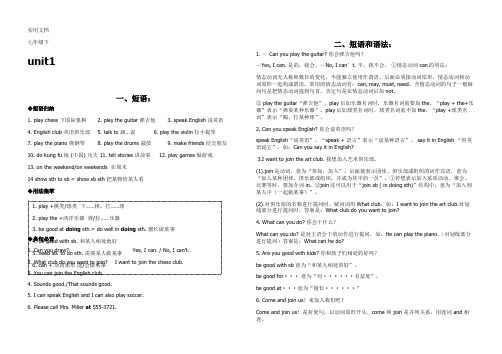
七年级下unit1一、短语:◆短语归纳1. play chess 下国际象棋2. play the guitar 弹吉他3. speak English 说英语4. English club 英语俱乐部5. talk to 跟…说6. play the violin 拉小提琴7. play the piano 弹钢琴8. play the drums 敲鼓9. make friends 结交朋友10. do kung fu 练 (中国) 功夫 11. tell stories 讲故事 12. play games 做游戏13. on the weekend/on weekends 在周末14 show sth to sb = show sb sth 把某物给某人看◆用法集萃◆典句必背1. Can you draw? Yes, I can. / No, I can’t.2. What club do you want to join? I want to join the chess club.3. You can join the English club.4. Sounds good./That sounds good.5. I can speak English and I can also play soccer.6. Please call Mrs. Miller at 555-3721.二、短语和语法:1. — Can you play the guitar? 你会弹吉他吗?—Yes, I can. 是的,我会。
—No, I can’t. 不,我不会。
①情态动词can的用法:情态动词无人称和数目的变化,不能独立使用作谓语,后面必须接动词原形,情态动词和动词原形一起构成谓语。
常用的情态动词有:can, may, must, need。
含情态动词的句子一般疑问句是把情态动词提到句首,否定句是在情态动词后加not。
七年级英语下册各章节知识点归纳总结

七年级英语下册各章节知识点归纳总结Unit 1: Our New Teachers- Vocabulary: teacher, subject, classroom, library, schoolbag- Grammar: Simple present tense, question words (what and who)Unit 2: My School Life- Vocabulary: timetable, break, lunchtime, homework, club- Grammar: Present continuous tense, imperativesUnit 3: At the Weekend- Vocabulary: movie, watch, play, go, chat- Grammar: Past simple tense, frequency adverbsUnit 4: My Family- Vocabulary: family member names, father, mother, brother, sister - Grammar: Possessive adjectives, possessive 'sUnit 5: My Hobbies- Vocabulary: hobby names, swim, dance, sing, paint- Grammar: Present simple tense, adverbs of frequencyUnit 6: My Future- Vocabulary: job, doctor, engineer, teacher, artist- Grammar: Future with 'going to', future time expressions (next year, in two years)Unit 7: Save Our World- Vocabulary: pollution, recycle, environment, energy, reduce- Grammar: Present continuous for future arrangementsUnit 8: At the Funfair- Vocabulary: buy, ride, eat, play, win- Grammar: Can for ability, superlative adjectivesUnit 9: In the Supermarket- Vocabulary: shopping, fruit, vegetable, meat, drink- Grammar: Countable and uncountable nouns, much and manyUnit 10: My Vacation- Vocabulary: beach, mountain, hotel, sightseeing, souvenir - Grammar: Past continuous tense, prepositions of placeUnit 11: Sports Day- Vocabulary: race, jump, throw, team, tournament- Grammar: Present perfect tense, ever and neverUnit 12: Our World Heritage- Vocabulary: heritage, monument, history, culture, traditionUnit 13: Celebrate!- Vocabulary: celebrate, festival, tradition, costume, ceremony - Grammar: Past simple vs. present perfect tenseUnit 14: Good Habits- Vocabulary: habit, exercise, healthy, sleep, stress- Grammar: Should for advice, should vs. shouldn'tUnit 15: Around the World- Vocabulary: country, capital, language, population, flag- Grammar: Adjectives for nationality, prepositions of time。
人教版七年级下册英语语法知识点归纳总结
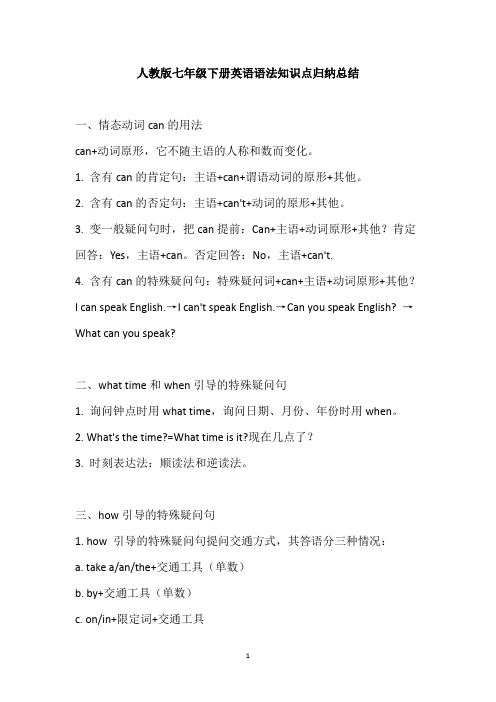
人教版七年级下册英语语法知识点归纳总结一、情态动词can的用法can+动词原形,它不随主语的人称和数而变化。
1. 含有can的肯定句:主语+can+谓语动词的原形+其他。
2. 含有can的否定句:主语+can't+动词的原形+其他。
3. 变一般疑问句时,把can提前:Can+主语+动词原形+其他?肯定回答:Yes,主语+can。
否定回答:No,主语+can't.4. 含有can的特殊疑问句:特殊疑问词+can+主语+动词原形+其他?I can speak English.→I can't speak English.→Can you speak English? →What can you speak?二、what time和when引导的特殊疑问句1. 询问钟点时用what time,询问日期、月份、年份时用when。
2. What's the time?=What time is it?现在几点了?3. 时刻表达法:顺读法和逆读法。
三、how引导的特殊疑问句1. how 引导的特殊疑问句提问交通方式,其答语分三种情况:a. take a/an/the+交通工具(单数)b. by+交通工具(单数)c. on/in+限定词+交通工具---How do you go to school every day?---I take a bus to go to school every day./I go to school by bus every day./I go to school on the bus every day.2. how far 用来提问距离,多远,其答语分为两种:(1)用长度单位表示:It is five kilometers.(2)用时间表示:It’s twenty minutes’walk.3. how long 用来提问时间,意为多久回答常用“for+段时”。
七年级下册英语各单元知识点归纳

七年级下册英语各单元知识点归纳七年级下册英语共有八个单元,包括Unit 1 Making a difference, Unit 2 Great people, Unit 3 Travel journal, Unit 4 Our world, Unit 5 Sharing, Unit 6 Animal world, Unit 7 Science and technology, Unit 8 Sports and health。
下面对每个单元的知识点进行归纳。
Unit 1 Making a difference:1. 基本动词的用法(is/am/are, have/has, do/does)2. 熟练掌握一般现在时的肯定句、否定句和疑问句的构造3. 可数名词和不可数名词的用法及其与冠词的搭配4. 形容词的基本用法5. 过去式动词的构成6. 宾语从句的引导词that的用法Unit 2 Great people:1. 一般过去时的肯定句、否定句和疑问句的构造2. 练习几个表示过去经历的词组和短语,如was/were, went to, saw, met, had等3. 表示习惯的副词 and used to的用法4. 形容词的最高级的构造及用法5. 练习几个形容词的比较级的构成及用法,如big-bigger, good-better, etc.6. 表示过去的时间状语的用法,如in 1998, last week, etc.Unit 3 Travel journal:1. 用there be句型描述地理位置,如There is a park in the town.第1页/共4页2. 学习有关城市、国家和世界各地的基本名称和信息,如countries, continents, cities, etc.3. 学习询问和描述位置的常用句型,如Where is...? It's in/on...4. 学习询问和描述交通方式的常用句型,如How do you go to...? I go by...5. 学习描述天气的常用句型,如What's the weather like? It'ssunny/cloudy/windy, etc.6. 学习描述食物的常用句型,如What do you want to eat? I want to eat...7. 学习描述节日和活动的常用句型,如Is there a...? Yes, thereis./No, there isn't.Unit 4 Our world:1. 学习地点介词的基本用法,如in, on, at等2. 学习描述日常活动的句型,如I get up at 7:00. He goes to school by bike, etc.3. 学习询问和描述时间的句型,如What time do you...? I... at...4. 学习表示频率的副词的用法,如always, usually, often, sometimes, never等5. 学习询问和描述日程安排的句型,如What's your plan for...? My plan is to...6. 练习定语从句的引导词和用法,如who, which, where, when等Unit 5 Sharing:1. 学习权限动词can的用法,表示能力、许可和请求2. 学习询问和描述个人能力的句型,如Can you...? I can...3. 学习谈论和分享个人喜好和兴趣的句型,如I like... I'minterested in...4. 学习询问和描述物品的价钱的句型,如How much is/are...? It's... They're...5. 学习询问和描述购物需求的句型,如What do you want? I want...6. 学习名词性物主代词的用法,如mine, yours, his, hers, etc.7. 学习问路和指示方向的句型,如Excuse me, where is...? It's on the left/right.Unit 6 Animal world:1. 学习动物的基本名称,如lion, penguin, tiger, elephant, etc.2. 学习描述动物外貌和特征的形容词,如big, small, tall, short, etc.3. 学习描述动物习性和动作的动词,如eat, run, swim, fly, etc.4. 学习用there is/are句型描述动物的句型,如There is a lion in the zoo.5. 学习询问和描述动物数量的句型,如How many... are there? There are...6. 学习询问和描述动物食物的句型,如What do... eat? They eat...7. 学习常见的动物园动物和其所属的科,如mammals, birds, reptiles, etc.8. 学习描述动物习性和栖息地的句型,如Lions live in Africa. They sleep in the daytime.Unit 7 Science and technology:1. 学习描述科技产品和设备的基本词汇,如mobile phone, computer, TV, etc.2. 学习询问和描述使用科技产品的方式的句型,如How do you...? I... with...3. 学习科技产品的功能和用途的句型,如What can it do? It can...4. 学习询问和描述科技产品的方便之处和不方便之处的句型,如Is it...? Yes, it is./No, it isn't.第3页/共4页5. 学习描述科技产品的发展和创新的句型,如In the past, people... Now, they...Unit 8 Sports and health:1. 学习描述运动和活动的基本词汇,如play basketball, swim, run, dance, etc.2. 学习询问和描述运动和活动的频率的句型,如How often do you...?I... every...3. 学习询问和描述运动的喜好的句型,如What sports do you like? I like...4. 学习询问和描述身体健康状况的句型,如How are you? I'm (I)have a headache, etc.5. 学习描述饮食习惯和作息时间的句型,如I usually... I go to bed at...6. 学习询问和描述健康建议的句型,如What should I do? You should...7. 学习询问和描述身体部位和病痛的句型,如What's wrong with you?I have a sore throat.以上是七年级下册英语各单元的知识点归纳,希望对你有帮助!。
七年级下册英语unit_1-12单元全册知识点归纳与复习总结
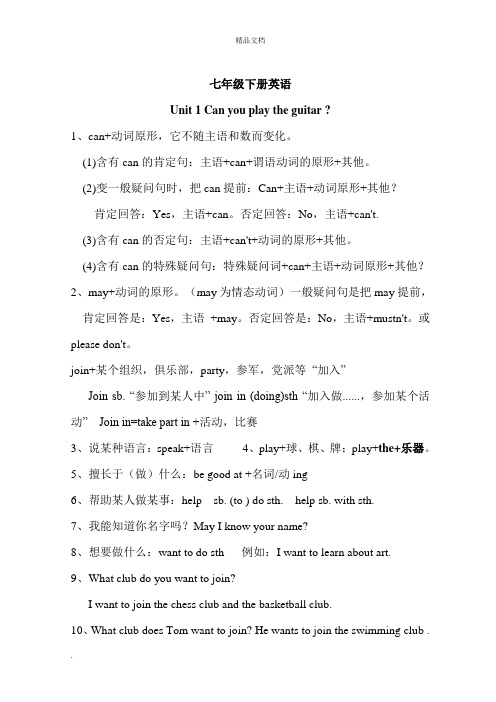
七年级下册英语Unit 1 Can you play the guitar ?1、can+动词原形,它不随主语和数而变化。
(1)含有can的肯定句:主语+can+谓语动词的原形+其他。
(2)变一般疑问句时,把can提前:Can+主语+动词原形+其他?肯定回答:Yes,主语+can。
否定回答:No,主语+can't.(3)含有can的否定句:主语+can't+动词的原形+其他。
(4)含有can的特殊疑问句:特殊疑问词+can+主语+动词原形+其他?2、may+动词的原形。
(may为情态动词)一般疑问句是把may提前,肯定回答是:Yes,主语+may。
否定回答是:No,主语+mustn't。
或please don't。
join+某个组织,俱乐部,party,参军,党派等“加入”Join sb. “参加到某人中” join in (doing)sth “加入做......,参加某个活动” Join in=take part in +活动,比赛3、说某种语言:speak+语言4、play+球、棋、牌;play+the+乐器。
5、擅长于(做)什么:be good at +名词/动ing6、帮助某人做某事:help sb. (to ) do sth. help sb. with sth.7、我能知道你名字吗?May I know your name?8、想要做什么:want to do sth 例如:I want to learn about art.9、What club do you want to join?I want to join the chess club and the basketball club.10、What club does Tom want to join? He wants to join the swimming club .11、He can’t play the violin or the piano. Can you help kids with swimming?12、Why do you want to join the English club? Because I want to learn English well.Unit 2 What time do you go to school ?1、what time和when引导的特殊疑问句。
七年级英语下册unit1知识点归纳
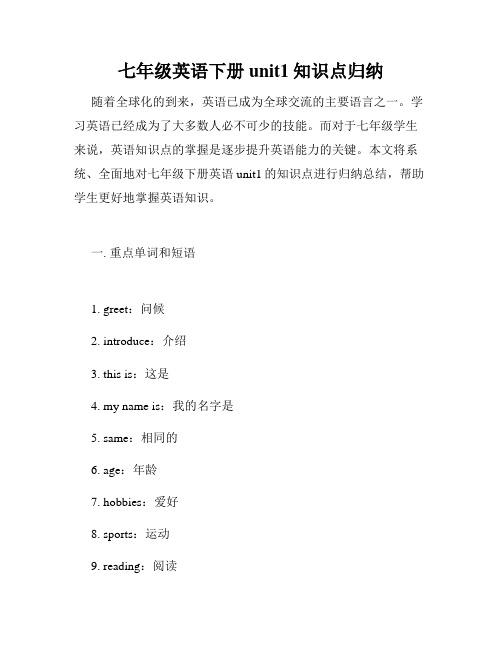
七年级英语下册unit1知识点归纳随着全球化的到来,英语已成为全球交流的主要语言之一。
学习英语已经成为了大多数人必不可少的技能。
而对于七年级学生来说,英语知识点的掌握是逐步提升英语能力的关键。
本文将系统、全面地对七年级下册英语unit1的知识点进行归纳总结,帮助学生更好地掌握英语知识。
一. 重点单词和短语1. greet:问候2. introduce:介绍3. this is:这是4. my name is:我的名字是5. same:相同的6. age:年龄7. hobbies:爱好8. sports:运动9. reading:阅读10. watching TV:看电视11. listening to music:听音乐12. playing computer games:玩电脑游戏13. making model planes:制作模型飞机14. having parties:举办聚会15. after school:放学后以上单词和短语是本单元的重点,学生可以通过对这些单词和短语的掌握,更好地理解本单元的语言环境和情境。
二、句型及用法1. How are you?:你好吗?2. I'm fine, thank you:我很好,谢谢3. What's your name?:你叫什么名字?4. My name is...:我的名字是5. Nice to meet you.:很高兴见到你。
6. This is my friend...:这是我的朋友...7. He/She is...:他/她是...8. What are your hobbies?:你的爱好是什么?9. I like...:我喜欢...10. What do you do after school?:放学后你做什么?11. I usually...:我通常会...12. But sometimes...:但有时候...掌握以上句型及其用法,可以帮助学生在真实的语言环境中更好地进行交流和表达。
人教版七年级下册英语各单元知识点归纳
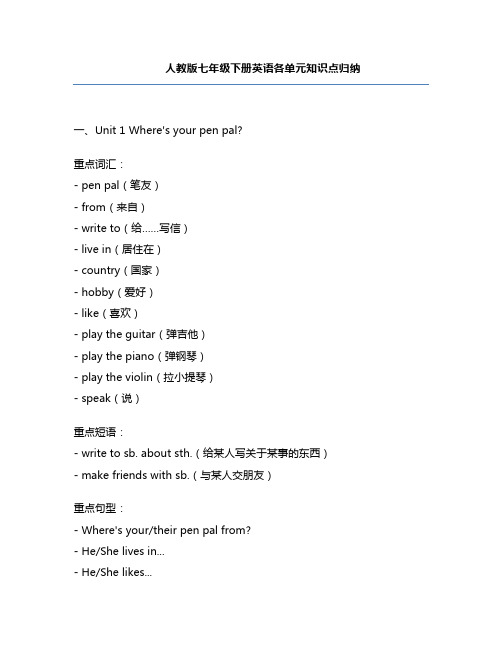
人教版七年级下册英语各单元知识点归纳一、Unit 1 Where's your pen pal?重点词汇:- pen pal(笔友)- from(来自)- write to(给……写信)- live in(居住在)- country(国家)- hobby(爱好)- like(喜欢)- play the guitar(弹吉他)- play the piano(弹钢琴)- play the violin(拉小提琴)- speak(说)重点短语:- write to sb. about sth.(给某人写关于某事的东西)- make friends with sb.(与某人交朋友)重点句型:- Where's your/their pen pal from?- He/She lives in...- He/She likes...- What does he/she do?二、Unit 2 How do you get to school?重点词汇:- by bus(乘公共汽车)- by bike(骑自行车)- on foot(步行)- subway(地铁)- train(火车)- airport(机场)- station(车站)- go to school(去学校)- go home(回家)- take a bus(乘坐公共汽车)重点短语:- How do you get to...?- by + 交通工具(乘坐……交通工具)- on + 交通工具(乘坐……交通工具)重点句型:- How do you get to school?- I usually go to school by bus.- Sometimes I take the subway.三、Unit 3 Why do you like pandas?重点词汇:- animal(动物)- zoo(动物园)-可爱 - cute- interesting(有趣的)- quiet(安静的)- friendly(友好的)- shy(害羞的)- smart(聪明的)- lazy(懒惰的)重点短语:- Why do you like...?- I like... because...重点句型:- Why do you like pandas?- I like pandas because they're cute.四、Unit 4 I want to be an actor.重点词汇:- actor(演员)- doctor(医生)- engineer(工程师)- scientist(科学家)- artist(艺术家)- cook(厨师)- astronaut(宇航员)- police officer(警察)- pilot(飞行员)- want to be(想成为)重点短语:- What do you want to be? - I want to be...重点句型:- What do you want to be? - I want to be an actor.五、Unit 5 My school day重点词汇:- class(课)- schedule(日程表)- science(科学)- math(数学)- English(英语)- art(艺术)- history(历史)- music(音乐)- PE(体育)- go to the movies(去看电影)重点短语:- What time do you...?- I usually...重点句型:- What time do you get up?- I usually get up at 6:30.六、Unit 6 It's raining!重点词汇:- weather(天气)- sunny(晴朗的)- cloudy(多云的)- windy(有风的)- rainy(下雨的)- snowy(下雪的)- foggy(有雾的)- hot(热的)- cold(冷的)- warm(温暖的)重点短语:- It's raining!- It's going to...重点句型:- What's the weather like?- It's sunny.七、Unit 7 How do you make a banana milk shake?重点词汇:- banana(香蕉)- milk(牛奶)- shake(奶昔)- ice cream(冰淇淋)- fruit(水果)- water(水)- juice(果汁)- put...in...(把……放在……里)- mix(搅拌)重点短语:- How do you make...?- First, ...- Next, ...- Then, ...- Finally, ...重点句型:- How do you make a banana milk shake? - First, I peel the banana.八、Unit 8 Have you read this book?重点词汇:- book(书)- read(读)- story(故事)- animal(动物)- science fiction(科幻小说)- mystery(神秘小说)- comic book(漫画书)- magazine(杂志)- novel(小说)- have read(已经读过)重点短语:- Have you read...?- Yes, I have. / No, I haven't.重点句型:- Have you read this book?- Yes, I have.九、Unit 9 Can you play the guitar?重点词汇:- play(玩)- guitar(吉他)- piano(钢琴)- violin(小提琴)- drum(鼓)- sing(唱)- dance(跳舞)- draw(画)- can(能)重点短语:- Can you...?- Yes, I can. / No, I can't.重点句型:- Can you play the guitar?- Yes, I can.十、Unit 10 I'm going to study computer science.重点词汇:- study(学习)- science(科学)- math(数学)- art(艺术)- English(英语)- history(历史)- music(音乐)- computer science(计算机科学)- be going to(将要)重点短语:- I'm going to...- What are you going to do?重点句型:- I'm going to study computer science. - What are you going to do?。
七年级英语下册知识点归纳总结

七年级英语下册知识点归纳总结 第一单元:School Life 本单元主要是介绍学校生活的相关话题。学生们学习了关于学科、教室、上课、课程表、学校设施等方面的表达和用语。
1. 学科(Subjects) - 国语:Chinese - 数学:Mathematics - 英语:English - 物理:Physics - 化学:Chemistry - 历史:History - 地理:Geography - 音乐:Music - 美术:Art - 体育:Physical Education 2. 教室(Classroom) - 教师:Teacher - 学生:Student - 黑板:Blackboard - 课本:Textbook - 笔:Pen - 铅笔:Pencil - 橡皮:Eraser - 尺子:Ruler - 讲台:Podium - 课桌:Desk - 椅子:Chair 3. 上课(Class) - 上课:Have a class - 课堂:Classroom - 问题:Question - 回答:Answer - 学习:Study - 教学:Teach - 听写:Dictation - 阅读:Read - 写作:Writing - 作业:Homework 4. 课程表(Timetable) - 星期一:Monday - 星期二:Tuesday - 星期三:Wednesday - 星期四:Thursday - 星期五:Friday - 星期六:Saturday - 星期日:Sunday 5. 学校设施(School Facilities) - 图书馆:Library - 实验室:Laboratory - 体育场:Sports field - 游泳池:Swimming pool - 礼堂:Assembly hall - 餐厅:Cafeteria - 停车场:Car park - 花园:Garden - 健身房:Gym 第二单元:Hobbies and Interests 本单元主要是学习关于爱好和兴趣的表达和用语,以及描述兴趣爱好的频率和原因等内容。
- 1、下载文档前请自行甄别文档内容的完整性,平台不提供额外的编辑、内容补充、找答案等附加服务。
- 2、"仅部分预览"的文档,不可在线预览部分如存在完整性等问题,可反馈申请退款(可完整预览的文档不适用该条件!)。
- 3、如文档侵犯您的权益,请联系客服反馈,我们会尽快为您处理(人工客服工作时间:9:00-18:30)。
初一下册英语知识点归纳 初一英语下册知识点归纳 Unit 1 Can you play the guitar? 一、 单词与词组 Guitar 吉他sing 唱歌,swim 游泳dance 跳舞,draw 画画,chess 西洋棋 Join: 表示“参加,加入”,此处指参加社团或组织,成为其中的成员。 Join the army 参军 Join the NBA 加入美国篮球协会 Join the art/sports/music/English/chess club 参加体育/音乐/英语/象棋俱乐部 乐器类+the play the guitar /the violin/the drums/the piano 非乐器类+ the play soccer/ basketball/volleyball/football/tennis/badminton (英式足球 / 篮球 / 排球 /英式足球,美式橄榄球/网球/羽毛球) Be good at+ sth./doing sth. 擅长做某事 Be good with 与…相处得好 Be good to 对…友好=be friendly to Be good for 对…有好处 Like to do sth.特指某一次的动作; like doing sth. 强调经常性的爱好。 两者都表示喜欢做某事,在仅仅表达“喜欢”时两者可以通用。 Tell: Tell stories 讲故事 tell sb. sth. /to do sth. /not to do sth.告诉某人某事/不要做某事 Help: Help sb. to do sth. /help sb. with sth./ help sb. do sth. 帮助某人做某事 Help yourself/sb. (to sth.)把某物(尤其是指食物,饮料等)拿给自己/某人 can't help doing sth.情不自禁做某事 Call at 用于打某人的电话 e.g. Call Mr.Brown at 293-7742 Home:1. 表示动态概念。意思是“回家”,“到家”。前面不加介词。这里的home 是副词,表示目的地。 e.g. 1)When do you go home every day?你每天什么时候回家? 2)He drives home after work.他下班的开车回家。 3)She often does some shopping on his way home. 她经常在回家途中买些东西。 2. at home 表示静态概念。意思是“在家”。这里的home 是名词,表示具体地点。 e.g. 1) Is she at home? 她在家吗? 2)He left his book at home. 他把书放在家里了。 Go home 回家 get home 到家 at home 在家 Also 也,而且;较正式,用于肯定句,紧跟动词。 e.g. I can speak English and I can also speak Chinese. 我能说英文也能说中文。 Too 多用于口语,放在句末。 E.g. Me too. Either 多用于否定句,放在句末。E.g. He hasn’t finished, either. 他也没有完成。 Show sb. sth. /show sth. To sb. 展示给某人看 play 也 Show time 作秀时间,表演开始 talk show 脱口秀(美国脱口秀节目) 二.重点句型 Can you swim? 你会游泳吗? Yes, I can./ No, I can’t. 是的,我会。/不,我不会 What can you do ?你会什么? I can dance./ I can’t sing. 我会跳舞。/ 我不会唱歌。 What club do you want to join?你们想加入哪个俱乐部? We want to join the chess club.我们想加入象棋俱乐部。 Unit 2 What time do you go to school? 一、单词与词组 Run跑, brush v.刷:刷净n 刷子, clean v.打扫;弄干净adj. 干净的exercise v&n 锻炼,练习,walk n&v 行走,步行. work n&v 工作taste v.品尝n.味道,滋味usually adv.通常地,一般地, never adv. 从不,绝不quarter n. 一刻钟,四分之一,forty num. 五十 Get dressed 穿上衣服, brush one’s teeth 刷牙, eat breakfast 吃早餐, take a shower洗淋浴, do one’s homework做作业, take a walk 散步 二、语法点 时间连词:when=while 当…时 then 然后after that 在那之后 at+时间点/sb. do sth. at about +时间点 for breakfast/lunch/dinner… 睡觉go to bed=go to sleep 睡觉 take a tap 午休,小睡一会儿反:get up 起床 Time 表时间,不可数;表次数,可数。 Some times 几次 sometimes 有时 some time 一段时间 sometime 某个时候 系动词It tastes/smells/looks/sounds/feels尝起来/闻起来/看起来/听起来/摸起来(含被动意味, 但不能用被动语态) tastes/smells/looks/sounds/feels+like 尝起来/闻起来/看起来/听起来/摸起来像…either…or…二选一 neither…nor… 两者都不 连接两个主语时,其谓语动词应与最近的一个主语在人称和数上保持一致,即"就近原则"。 e.g. Either you or I am going there tomorrow. 明天要么你去那里,要么我去那里。 Neither dad nor mum is at home today. 今天父母都不在家。 Here引导的倒装句表位置的副词放在句首时,如主语是代词,不倒装;表位置的副词放在句首时,如主语是名词,要用全部倒装。 e.g. Here it is! Here he comes.(代词不倒装) Here is your ticket. Here comes the bus. (名词倒装) 关于时间的问法 (1)以when提问,“什么时候”可以是较长的时间段,也可以是较短的时间点 ①When is your birthday? 你的生日是什么时候? ②My birthday is Dec. 29th. 我的生日是12月29日。 这里就是指一天的时间段 ①When do you go home? 你几点回家? ②I go home at 4:30 p.m. 我下午4:30回家. 这里when问的是具体的时间。 (2)具体几点我们通常用what time提问 ①What time is it now? 现在几点了?or What’s the time?几点了? It’s 9:26.现在九点二十六。 ②What time is it by your watch? 你手表几点了? It’s 8:36. Oh, It’s 50 minutes late8:36,哦,它慢了50分钟。 ③What time do you get up? 你几点起床? I get up at 6:00 a.m. 我早上6点起床。 三、重要句型 What time do you usually get up ? I usually get up at six thirty. What time does Rick eat breakfast. He eats breakfast at seven o’clock. When does Scott go to work? He always goes to work at eleven o’clock. Unit 3 How do you get to school? 一、单词 Train 火车, bus公共汽车, subway地铁, bike自行车, car小汽车, boat小船, river河,江, year年, minute 分钟, kilometer千米,公里, sixty六十, seventy,七十eighty八十, ninety 九十, hundred一百, ride v.骑n 旅程, drive v.开车, live v.居住,生活leave v.离开, cross v.穿过,越过 二,词组 Take the train/ bus乘火车/公共汽车 go by bike/subway ride a bike骑自行车 driver a car 开车 think of 想起 between ....and ... 在...和...之间 Leave home/school 离开家/学校 come true实现 many students是单指学生数量多,侧重数量 many of the students是指学生中很多一部分,强调部分 too…太… 1. too much意为“太多”,+不可数名词/+动词。 e.g.I had too much housework to do yesterday . 昨天我有太多的家务活要干。 She talks too much . 她说话太多。 much too意思是“过分,太”,隐含了过分而不恰当之意,much too+形容词或副词,不+动词。 e.g.The question is much too difficult . 这道题太难了。 You’re walking much too fast . 你走得太快了。 2.too…to…太…而不能….e.g. You are never too young to study. 同:so…that…太…以至于…
